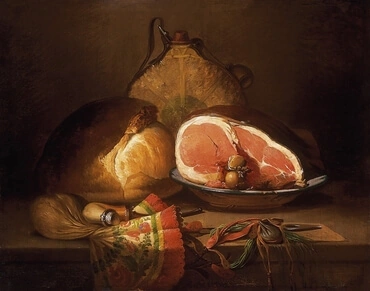8409. As regards 'flesh' and its meaning the proprium in both the genuine and contrary senses, in the highest sense it is the Lord's Divine proprium, which is His Divine Human, and so is the good of His love towards the entire human race. From this in the sense that relates to man 'flesh' means a proprium made alive by the Lord's Proprium; that is, it is the Lord's Proprium present with the person, and so is the good of love to Him. Regarding the meaning of 'flesh' in this sense, see 3813, 7850. But in the contrary sense 'flesh' is the proprium that is man's own, thus the evil of self-love, and consequently the desires of that love, which are cravings, 999, 3813. The proprium that is man's own is nothing but evil, see 210, 215, 694, 874-876, 987, 1023, 1044, 1047, 3812 (end), 5660, 5786. The fact that 'flesh' means the proprium that is man's own, thus evil of every kind, is in addition clear from the following places: In Isaiah,
I will feed your oppressors with their flesh, and they will be drunk with their blood as with new wine. Isaiah 49:26.
'Feeding with flesh' stands for filling with their own evil.
[2] In Jeremiah,
Cursed is the man (vir) who trusts in man (homo), and makes flesh his arm, but his heart departs from Jehovah. Jeremiah 17:5.
'Making flesh his arm' stands for trusting in power that is one's own; therefore eating the flesh of one's arm stands for trusting in self, Isaiah 9:20. In Isaiah,
Egypt is man (homo) and not God, and his horses are flesh and not spirit. Isaiah 31:3.
'Horses of Egypt' stands for factual knowledge belonging to a perverted understanding, 6125; 'flesh' stands for what is dead, and 'spirit' for what is living. This is why the Egyptians 1
are called great in flesh, Ezekiel 16:26. The expression 'what is dead' is applied to evil, since evil leads to spiritual death, and 'what is living' is applied to good, since good leads to spiritual life.
[3] This explains why 'flesh' and 'spirit' are set in contrast to each other in the Word, as in John,
That which has been born of flesh is flesh, and that which has been born from the spirit is spirit. John 3:6.
In the same gospel,
It is the Spirit who bestows life, the flesh does not profit anything. The words which I speak to you, they are spirit and they are life. John 6:63.
In the Book of Genesis,
Jehovah said, My spirit will not reprove man forever, in that he is flesh. Genesis 6:3.
'Flesh' here stands for the proprium that is man's own. Similarly in Matthew,
Jesus said, Blessed are you, Simon son of Jonah, for flesh and blood has not revealed this, but My Father who is in heaven. Matthew 16:17.
And in John,
As many as received Him, to them He gave power to be sons of God, to those believing in His name, who were born, not of blood, 2
nor of the will of the flesh, nor of the will of man (vir), but of God. John 1:12-13.
'The will of the flesh' stands for the proprium, the will part, 'the will of man' for the proprium, the understanding part; and 'sons of God' stands for those who have been regenerated. And those undergoing regeneration all receive life from the Lord's Proprium, which is the Lord's Flesh and body and is Divine Goodness itself.
[4] Since 'flesh' in the contrary sense means the proprium that is man's own, and so means evil, it also means craving, for the life of the flesh, which belongs properly to the body, consists of nothing else than the desires of the senses, the delights of the bodily appetites, and cravings. The fact that 'flesh' means craving is clear from the following verses in Moses,
The rabble who were in the midst of the people had a strong craving, and so the children of Israel wept repeatedly and said, Who will feed us with flesh? But now our soul is dry; there is nothing at all except the man[na] for our eyes [to look] at. And Jehovah said to Moses, You shall say to the people, Sanctify yourselves for tomorrow, in order that you may eat flesh; for you have wept in the ears of Jehovah, saying, Who will feed us with flesh, for it was better for us in Egypt? Jehovah will give you flesh to eat - for a whole month, 3
until it comes out of your nose and is loathsome to you. The flesh was still between their teeth, before it could be swallowed when Jehovah's anger flared up against the people, and Jehovah struck the people with an extremely great plague. So he called the name of that place The Craves of Craving, because there they buried the people having the craving. Numbers 11:4, 6, 16, 18, 20, 33-34.
From all this one may now see what 'sitting by a pot of flesh in the land of Egypt' means, namely a life according to their own pleasure and such as they craved for, which is the life of the proprium.
脚注:







